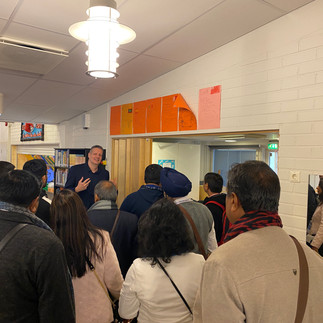
Between October 22-28, 2023, Cambridge Education Lab organised Finland Education Exploration programme for Indian school leaders. In this programme, educators from over 10 Indian states were hosted at Helsinki and Turku in Finland and provided with knowledge of the Finnish education system and how best practices can be applied to the Indian Education System. A comprehensive report, highlighting the learnings of this programme has now been launched for every School leader in India. It delves into the potential adaptation of the Finnish Education Model to the Indian context and offers insights on innovative teaching methods, early education, teacher training, student well-being, decentralization, and more, drawing inspiration from the Finnish education system. The report highlights a comparative analysis of Finnish and Indian education systems and concludes with policy recommendations, aiming to enhance the quality of education in India by integrating elements from the successful Finnish model.
It concludes with recommendations, that aim to transform India's education system, making it more learner-centric, globally competitive, and aligned with the principles that have contributed to the success of the Finnish education model. These recommendations seek to foster inclusivity, nurture creativity, and instil a lifelong love for learning, ultimately making India's education landscape more adaptable, globally competitive, and attuned to the diverse needs of its students, teachers and every other stakeholder.
Finland programme highlights
Day 1 (Helsinki)
The first day of the Education programme was dedicated to learning about the Finnish Education system at the Finnish National Agency for Education. Ms. Ida Immonen and Dr. Marjo Rissanen introduced the basic structure of Finnish education system to the delegates. They provided an overview of how the National agency has considered minute aspects of the demographics in Finland to develop a robust two-tier National administration system. Dr. Rissanen highlighted the basic principles that guide the development of the school culture in Finland, and how these principles could also be applied to other education systems across the world. She emphasised that the ultimate goal must be to promote learning, participation, well-being, and a sustainable way of living.
Day 2 (Kerava)
The day two of the program was divided into two parts, observing a Kindergarten and interaction with the head of Early Education, responsible for all the schools within the limits of the city of Kerava. The delegation was divided into smaller groups who were all taken to two different Kindergartens (Heikkilän päiväkoti and Jaakkolan päiväkoti) for observations. The head and the deputy head of the schools shared their insights about the unique methodology to facilitate high quality learning by dividing pupils into different groups. They also highlighted the role of Principals to not take care of day to day activities but provide mentoring to the teachers. Later, the delegation met with Ms. Hannele Koskinen, Head of Early Years Education in Kerava, who shared with the delegates templates of how the municipality assesses the quality of education and deploys new methods based on a comprehensive analysis of feedback by all stakeholders, which include parents union, who are integrated into the system to provide collaborative feedback.
Day 3 (Helsinki)
On the third day of the program, the delegates were welcomed to Viherlaakson Koulu, a distinguished Microsoft showcase school and a primary school in Finland. Here, they witnessed first-hand how technology is revolutionising the education landscape. Mr. Mikko Leppanen, the Principal of Viherlaakson Koulu, took the delegates on an inspiring journey into the world of Information and Communication Technology (ICT) in education.
Mikko Leppanen showcased the extraordinary use of ICT to enhance the learning experience for students. He demonstrated how 3D simulations and modern technology are leveraged to teach complex topics in a fun and engaging manner. This innovative approach not only makes learning more enjoyable but also ensures that students have a deeper and more comprehensive understanding of the subject matter. Through technology, Viherlaakson Koulu has effectively turned traditional classrooms into dynamic and interactive learning spaces. In a world driven by technological advancements, the role of technology in education has become more critical than ever. Finland, renowned for its exemplary education system, has been at the forefront of integrating technology into primary and upper secondary education.
Day 4 (Turku)
Continuing their journey through the Finnish education system, the delegates transitioned to a high school in Turku on the fourth day. The high school environment offered valuable insights into how technology is leveraged at the upper secondary level. The school opened its active classrooms, providing a first-hand look at the innovative methods employed to enrich the educational experience.
The principal and teachers at the high school engaged with the Indian delegates, explaining how they tackle educational challenges using unique and novel approaches. Jussi Paavola, the Service Director of the school, highlighted the distinctive structure of upper secondary education in Finland. He emphasized the flexibility offered to students in choosing their academic paths. Whether it's pursuing fields like theatre, sports, information and communication technology (ICT), music, or natural sciences, Finnish students have the freedom to tailor their education according to their interests and aspirations.
Day 5 (Turku)
On day 5 of the programme, The delegation visited a secondary school in Parainen, where they had the privilege of meeting Ms. Nina Aspegren. Ms. Aspegren, a celebrated educator who was recently awarded the prestigious title of "Teacher of the Year" in Finland for her excellence in teaching mathematics and science, welcomed the Indian guests into her classroom. Ms. Aspegren's teaching method is centered around activity-based learning, especially for complex mathematical concepts. Rather than relying on traditional rote learning, she encourages students to actively participate in their learning journey. Her approach involves hands-on activities, experiments, and group discussions, which provide a deep understanding of the subjects and promote critical thinking and problem-solving skills.
From the secondary school, the delegation embarked on a journey to the University of Turku (Åbo Akademi). Here, the Faculty of Education's collaboration with schools and innovative approaches to teacher training took center stage. The delegates met with Mr. Christian Ahläng, Mr. Kim Virta, Ms. Elin Kjellberg, and Ms. Linda Karvonen, who provided comprehensive insights on how the University develops high quality teaching professionals.
Post programme initiatives
On 30th November, 2023, a comprehensive report titled "Adapting Finnish Education Model for India" was launched at School Leaders' summit 2023, held in Chandigarh, India. This report highlights the concentrated learnings of the Finland programme and is very useful for all stakeholders of the School community. It will soon be available for purchase.

Finland programme press coverage





























































